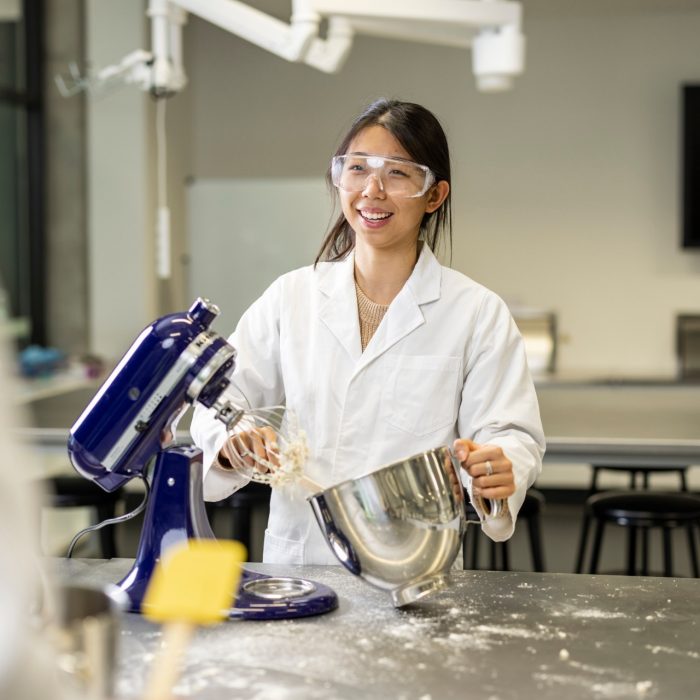Nutrition, dietetics & food innovation

Shaping the future of health & food industries
More than ever, the world needs big-picture thinkers who can tackle current and future problems from a holistic lens. One of the greatest challenges of our time is uplifting and maintaining strong health outcomes for all. This requires a multidisciplinary approach that focuses on health promotion and disease prevention to create healthier, more resilient communities.
Three disciplines at the centre of this effort are nutrition, dietetics and food innovation. How we feed and fuel our families, how we manage food systems, and how we produce, manufacture and distribute food. With our degrees in nutrition, dietetics and food innovation, you’ll be equipped to make a significant contribution to the health and prosperity of global communities.
The role of nutrition, dietetics & food innovation
Dietitians and nutritionists help people navigate the connection between food and health. However, there are differences in qualifications and regulation for each profession. In Australia, the dietetic profession is regulated and requires an approved degree in dietetics from an Australian university. Unlike dietitians, nutritionists are not qualified to provide medical nutrition therapy or work in hospitals and cannot receive Government-applied rebates for services.
With a nutrition degree, you’ll gain an understanding of the nutrients in food, how the body uses them, and the relationship between diet, health and disease. It incorporates elements of biology, biochemistry, human physiology and human nutrition.
Dietetics is an allied health profession that applies the science of food and nutrition to optimise health, treat illnesses and prevent the onset of chronic diseases. With an approved degree in dietetics, you can help people manage health conditions such as diabetes, cancer, heart disease, kidney disease, gastrointestinal diseases, obesity and food allergies. Dietitians play a vital role in improving public health by educating people on the importance of healthy eating.
Food innovation examines all aspects of the food value chain, from agriculture, food science, food manufacturing and the retail sector, through to innovations and digital technologies. It looks at how we can improve the food system to address food equity and sustainability challenges. Engagement with food systems and the food industry provides opportunities for the dietitians of the future.
Join one of Australia's top medicine and health faculties
UNSW Medicine & Health is creating the leaders of tomorrow. We have connections with some of Australia’s best hospitals, private practices and health organisations. UNSW’s degrees in nutrition and dietetics give you access to world-class facilities across our Kensington campus, rural and metropolitan teaching hospitals, and research centres and institutes. Our $1B commitment to developing dedicated health precincts around the state will open up opportunities for a broad range of clinical placements in Sydney and beyond.
As a global top 20 university (QS World University Rankings, 2024–2026) known for excellence in research, our Medicine & Health research directly changes health policy and practice to meaningfully improve health outcomes for communities. Whether you’re studying for a nutrition degree or a degree in dietetics and food innovation, you’ll have the opportunity to get involved in initiatives within our seven research centres and institutes, including the International Centre for Future Health Systems, where nutrition plays a vital role in health promotion and disease prevention.
Prepare for career success
With our degrees in nutrition, dietetics and food innovation, you could pursue roles in dietetics, consulting, advocacy, research, government, health promotion, food business/marketing/sustainability, product development, food not-for-profit organisations and agriculture.
With an approved degree in dietetics, you can pursue a career as a dietitian. You’ll be equipped to provide a range of services to help people manage their nutritional requirements, including medical nutrition therapy, food service management, sports nutrition and public health nutrition. Dietitians work across a range of settings, including hospitals, private practices, research organisations, and within health and food industries.
Accredited Practising Dietitians (APDs) are eligible to receive rebates through Medicare, the Department of Veterans’ Affairs (DVA), the National Disability Insurance Scheme (NDIS) and a large range of health insurance funds.
How to become a dietitian in Australia
You need an approved degree in dietetics to become a practising dietitian in Australia.
-
Pre-accreditation in progress (accreditation expected early 2026)
UNSW has commenced the accreditation process with Dietitians Australia. Our program is on track to meet all Accreditation requirements ahead of our first cohort’s graduation. A graduate of an accredited program is eligible to join the Accredited Practising Dietitian (APD) Program.
Full details of the stages in the DA accreditation process are available on the Dietitians Australia website. All enquiries regarding the progress of the Program’s Accreditation review should be directed to the Dietetics Program Authority, Associate Professor Sara Grafenauer.
-
Australia’s largest professional organisation for people working in dietetics and nutrition. Dietitians Australia advocates for the role of Accredited Practising Dietitians (APDs) and raises awareness about the importance of nutrition in public health.
-
The Accredited Practising Dietitian (APD) credential reflects your level of dietetic expertise. The APD program, offered by Dietitians Australia, is the national credentialing program for dietitians in Australia. APDs are held to the National Competency Standards for Dietitians and must complete continuing professional development every year.
-
Our Bachelor of Nutrition/Master of Dietetics and Food Innovation will prepare you for professional practice. In just five years of full-time study, you’ll graduate with both an undergraduate degree and a postgraduate degree and be ready to pursue roles in health and non-health-related sectors.
Interested in exploring our other health programs at UNSW?
-
You can study nutrition, dietetics and food innovation in the following postgraduate research degrees:
Interested in studying nutrition, dietetics and food innovation?
Visit the School of Health Sciences to discover our related degrees.
